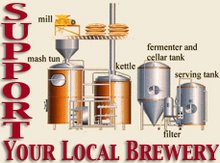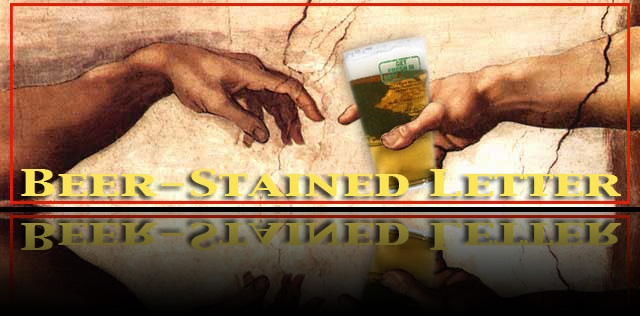A look at Flying Fish's future home
 Records, brake pads, and in a few months' time, beer.
Records, brake pads, and in a few months' time, beer.
Flying Fish's recently acquired building in Somerdale has led a few different lives in New Jersey's manufacturing world, but its new lease on life – a state-of-the-art beer producer – promises to give New Jersey its first-ever automated craft brewery and the first automated brewery in South Jersey in decades.
"A lot of our investment is on the packaging, and having more automation," Flying Fish founder Gene Muller said Wednesday after a walk-through of the building. "Our bottling line can do three times the speed than we do now, because we're hand packing it. We're just growing into our equipment."
It was last April when word got out that Flying Fish, long in need of a bigger facility and thwarted on previous attempts to find that larger space, had finally landed a suitable site that would fit the brewery's current and future needs.
Last week, Flying Fish officially announced what everyone had long accepted as fact: 1940 Olney Avenue in Cherry Hill, the only physical location the brewery founded on the World Wide Web in 1995 has ever known, would fade into glory by mid-spring of 2012, a farewell to the place that grew to producing 14,000 barrels of beer a year and hosted countless tours and twice-a-year Internet open houses that were halted a few years ago when space became an issue.
Right now, the new Somerdale home, tucked behind a Walmart just off Route 30, looks like an old, sprawling industrial complex that hasn't seen a tenant quite in a while.
"It needs a lot of work, but it's a nice, big open space," Gene says. "We've got enough land – five acres. We can't build on any of that because most of it is wetlands. But it will give us a chance to do maybe some parkland, rain gardens, things like that ... If we can get some favorable legislation, then we can either do events or festivals. It would be a great spot for that." Flying Fish has just begun to scratch the surface on turning the place into brewery.
Flying Fish has just begun to scratch the surface on turning the place into brewery.
They've cut drain trenches into the concrete floor of the portion where the brewhouse, fermenters and packaging will be set up, with more of that work to follow in the coming days.
Head brewer Casey Hughes (pictured above), no stranger to using AutoCAD, has been designing the brewery floor plan, with the help of sales director Andy Newell's wife.
(With just a little over a month and a half left in 2011, it looks like Flying Fish will produce only one brew this year in its Exit Series – Exit 9, the 9% ABV red ale that came out back in March. The next Exit beer is all worked out, as far as style and ingredients go, but the time crunch devoted to continuing to produce core brands and the Somerdale move may mean brewing the beer before year's end will have to be sacrificed. Fear not, Casey says the jump in brewing capacity thanks to the new home means some more past Exits can be brewed again.)
In a couple weeks' time, Casey is due to jet to northern Italy for training on the new kegging system, and then head to north Bavaria for training on the new German-manufactured automated 50-barrel brewhouse that will feed new 150-barrel fermenters, tripling Flying Fish's production capacity and making New Jersey's largest craft brewer look something like Troegs Brewing's new place in Hershey, Pa., only about half the size.
Somerdale, NJ, 08083
At just under 1.5 square miles, Somerdale is a blink-and-you-miss-it kind of town, one of those small towns in the flow of cars along Route 30 through Camden County. (Not quite 10 miles south of Cherry Hill, Somerdale is accessible off the New Jersey Turnpike from Exit 3.)
Somerdale officials have welcomed Flying Fish, happy the brewery is breathing new life into a 40something-year-old industrial site that has sat empty for the past couple of years, not to mention endured long stretches of sitting idle between uses. When it was occupied, the building housed a handful of manufacturing companies, such as a brake pads, and most recently millwork. But the site is probably best remembered as the Superior Record Pressing plant, a use that would resonate with folks who remember when 12-inch vinyl LPs and 7-inch 45s were fixtures in the music industry.
But the site is probably best remembered as the Superior Record Pressing plant, a use that would resonate with folks who remember when 12-inch vinyl LPs and 7-inch 45s were fixtures in the music industry.
Superior was part of Motown Records' vertical integration. The Somerdale site, bought by Motown founder/producer Berry Gordy in the early 1970s, was the forerunner to a sister record plant Motown had in Phoenix, Ariz. (Do an Internet search and you'll find the plant name pops up in recording industry news stories from the mid- to late-1970s in Billboard magazine.)
"It was originally just a warehouse for Motown Records in this region," Gene says. "Motown got so big that they actually started pressing the records here. Then he (Gordy) put a second floor onto the building, kind of a private office area, a kitchen and all of that. They were here for about a decade."
Once the new location is up and running, Flying Fish Version 2.0 will mark the return of automated brewing to South Jersey, something missing since Eastern Brewing, in Hammonton in Atlantic County, closed in the 1980s.
"That was a huge building. If you take the Atlantic City train, you can still see some of the old brewery buildings – they've been converted into offices and stuff. But that would be the last big one," Gene says. "Camden Brewing shut down in the mid-'50s, and I guess Trenton, Champale (Malt Liquor), that was down in the '70s, maybe early '80s."
Editor's note: The record image is a Photoshop creation, a mash-up of a Flying Fish keg collar and Web-grab of a 45 rpm record.














2 comments:
Champale, Inc. in Trenton (at the time a subsidiary of Iroquois Brands) didn't close until 1987, after the brand was sold to Heileman in late '86.
It was unique for being a major US brewery (1 million barrel capacity- with sales of around 300k bbl. and the 11th largest at the time of it's sale) without a standard US style adjunct lager beer as a flagship or major product.
Instead it's 3 major brands were the malt liquor Champale, Black Horse Ale* and a near beer "Metbrew" (the "Met" from it's previous name/owner- Metropolis). Their last notable lager beer was the well-respected (but hard to find even in NJ) Copenhagen Castle, which lasted at least into the 1970's.
Among early proto-beer geeks, they were best known as being one of 4 US brewers of the former Canadian label, Black Horse Ale. The others being MA's Diamond Spring, Koch and Genesee (the latter only briefly, after they bought the Koch brands in 1985).
Steve,
Many thanks on the lore. It connects the dots between then and now, fills in details that are in peril of being lost to the mists of time.
So a sincere thanks for that.
Post a Comment